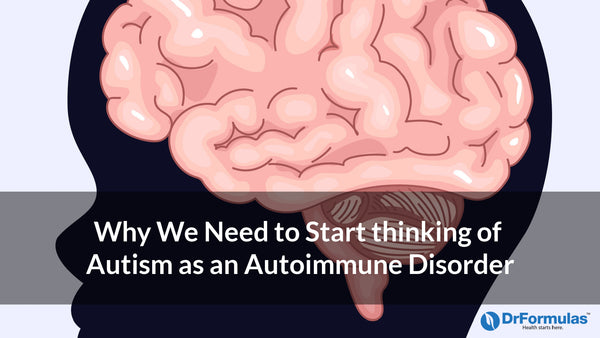
We currently live in one of the most prosperous eras in human history. However, the incidence of autism has skyrocketed from 1 in 1000 children in the 1990s to 1 in 54 children in the 2020s. What has changed? The increase in surveillance for autism alone does not explain why a previously rare disorder that has skyrocketed in prevalence.
Another disease that has skyrocketed in prevalence are autoimmune disorders such as allergies, asthma, and atopic dermatitis. While the two are correlated, correlation does not always equal causation until we look at the underlying factors for both diseases.
Autoimmunity happens when the body’s immune system does not recognize the body’s own cells as being “self” or “on the same team.” The immune system then starts mounting an attack against parts of the body thinking that these parts are “non-self.” If it attacks the skin it can be psoriasis, atopic dermatitis, or one of many several autoimmune skin diseases. If it attacks the joints it can be rheumatoid arthritis, etc. There are hints that autism is caused by an overactive immune system that attacks the body’s own central nervous system.
To understand why autism is happening to children much more frequently, it may be helpful to look at disease states that dramatically increase the risk of autism. Children with Mast Cell Activation Syndrome, or MCAS, have a normal number of mast cells but they are functionally overactive.
Mast cells have an important role in the immune system. They are a part of the immune system that defends against allergens and parasites such as worms. They may also play a role in wound healing. When they are activated, they degranulate and release chemical mediators that cause inflammation and irritation.
MCAS results in systemic release of those chemical mediators, which can end up in the central nervous system and cause symptoms such as brain fog, headache, fatigue/lethargy, lack of concentration, mild cognitive problems, and sleep disturbances.2 Because these cytokines and inflammatory markers can affect the brain, 1/10 children with MCAS develop autism compared to 1/100 children without MCAS.1
Several other studies support an autoimmune cause of autism. There appears to be a genetic component to the disease. The risk of developing autism increases if the parents or family of a child has an autoimmune diseases. Family history of hypothyroidism was associated with a 64% increase, type 1 diabetes a 49% increase, rheumatoid arthritis a 51% increase, and psoriasis a 59% increase3.
Children with ASD also tend to have higher rates of autoimmune diseases. One study analyzing patient data in Taiwan found that children with ASD had a 74% increase in risk of asthma, 70% increase for allergic rhinitis, 52% increase for atopic dermatitis (AD), a 46% increase risk for Crohn’s disease, and surprisingly, a 400% increase in diabetes type 1.4 Many other studies attempted to replicate the type 1 diabetes statistic.
A study by Kaiser Permanente did not find an increase in risk of type 1 diabetes in ASD children but did find similar increases in allergic rhinitis (30%), food allergies (62% higher chance) and amazingly, a 135% higher chance of psoriasis in children with ASD.5 There is a high correlation between psoriasis and ASD. Because the central nervous system and skin are derived from the same embryonic cell layer, the ectoderm, it would make sense that there is a link between the two.
Other skin conditions such as atopic dermatitis, a disease marked by increased water loss through the skin and itchy, red, irritated skin, is also associated with autistic spectrum disorders. Another study analyzing patient data from Taiwan National Health Insurance Research Database (NHIRD) found that the presence of any atopic disease in early childhood increased the risk of developing ADHD (risk ratio 1.97) and ASD (risk ratio 3.40) in later life.6 While the previous study found that children with ASD were 52% more likely to have AD, this study found that children with AD were 97% more likely to have ASD compared to non-AD children. Similar increases have been found comparing ASD children to their non-ASD peers.7-9 Furthermore, atopic dermatitis and other skin conditions are correlated with more severe ASD.10
With this many correlations between autism and other allergic diseases, it is time to start thinking of it as an autoimmune disorder. In our next article, we will go over things you can do to help reduce immune system overactivity.
Works Cited:
- https://link.springer.com/article/10.1007/s10803-010-1171-z
- https://www.mastattack.org/2014/10/mcas-neurologic-psychiatric-symptoms/
- https://www.sciencedirect.com/science/article/abs/pii/S014976341500130X
- https://www.sciencedirect.com/science/article/abs/pii/S1750946712001018
- https://www.researchgate.net/profile/Albin-Leong/publication/272199115_Immune_Mediated_Conditions_in_Autism_Spectrum_Disorders/links/606178e8299bf17367778593/Immune-Mediated-Conditions-in-Autism-Spectrum-Disorders.pdf
- https://www.sciencedirect.com/science/article/abs/pii/S0022399914002402
- https://link.springer.com/article/10.1007/s40489-015-0059-4
- https://jamanetwork.com/journals/jamapediatrics/article-abstract/205312
- https://jamanetwork.com/journals/jamanetworkopen/article-abstract/2683952
- https://www.nature.com/articles/s41398-022-02185-5


